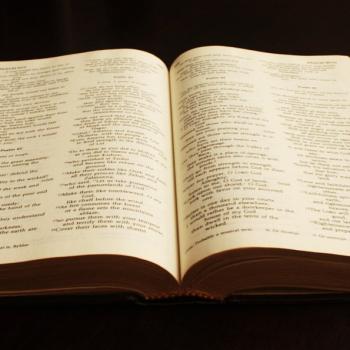
A Response to Dave Armstrong
Is there one “standard” definition of Sola Scriptura? In a recent Patheos article titled, “Reply to Gavin Ortlund’s 6-Minute Sola Scriptura Defense,” Dave Armstrong says there is. He took issue with me in that article for using a definition of Sola Scriptura that he disagrees with in a tract I wrote several years ago for the folks at St. Paul Street Evangelization (SPSE). Here is how I defined Sola Scriptura in that tract (as quoted in the “Reply to Gavin Ortlund” article):
“Many Christians believe that the Bible, and the Bible alone, is the sole authority, or the sole rule of faith, that one needs in order to know what is and is not authentic Christian teaching and practice…nowhere in the Bible does it say that the Bible should be used by Christians as the sole authority…”
Dave, however, defines Sola Scriptura in this way: “Sola Scriptura means that Scripture is the Church’s only infallible rule. It doesn’t mean that Scripture is the only authority.” “This,” Dave said, “is the standard Protestant definition and one that many Catholics don’t understand. Even some Catholic apologists don’t; for example, John Martignoni. In his case, I myself (as the editor of many of these particular tracts) tried to correct him by noting that the definition is as Gavin states here, but to no avail. In his tract, ‘The Bible Alone?’ (St. Paul Street Evangelization), John wrote about sola Scriptura…He never mentions the words infallible or infallibility, which are an essential part of the actual definition, as Protestants understand it to be.”
It just so happens that I disagree with a few things Dave said in the “Reply to Gavin Ortlund” article, so I’ve written this article in response. There are three things I want to accomplish here: 1) Demonstrate that Dave’s claim about the definition of Sola Scriptura as given in his article, being “the standard Protestant definition” of Sola Scriptura, is simply not valid; 2) Show that the difference between the definition of Sola Scriptura he uses, and the definition of Sola Scriptura I use (which some Protestants, and some Catholic apologists, for example, Dave Armstrong, call “Solo Scriptura”), is actually a distinction without a difference; and, 3) Set the historical record straight.
1) “The standard Protestant definition”
There is no authority in all of Protestantism that can definitively decide exactly what Sola Scriptura does or does not mean. So, when the claim is made that the definition used in Dave’s article is “the standard Protestant definition,” that isn’t quite true. Yes, it is “the standard Protestant definition” for some Protestants — particularly those in the Protestant apologist class that Armstrong usually deals with. But, it is not THE definitive, one and only, “standard Protestant definition” for all Protestants.
What authority within Protestantism is cited to back up the claim in regard to Armstrong’s definition being “the standard Protestant definition”? None. Why not? Because there is no overarching authority within Protestantism that can establish a “standard Protestant definition” for any of the uniquely Protestant doctrines. Which is why, when it comes to Protestant doctrine, there is almost nothing that comes with what could be called a “standard Protestant definition”.
Is there such a thing as a “standard Protestant definition”?
For example, what is the “standard Protestant definition” of Baptism? Depends on which Protestant you ask. Some will say Baptism is only for those who have reached the age of reason. Some will say it is for babies, too. Some will say it is purely symbolic. Some will say it is spiritually regenerative. Some will say it is only by immersion. Some will say it isn’t only by immersion. So, what is the “standard Protestant definition” on Baptism?
You could do the same with the Rapture. Is the Rapture Pre-Tribulation? Mid-Tribulation? Post-Tribulation? All three? None of the above? You have Protestants who believe in each of those possibilities. So, what is “the standard Protestant definition” of the Rapture?
I can ask the same question of pretty much any Protestant doctrine. The lack of an infallible authority within Protestantism that can definitively decide such doctrinal questions pretty much precludes there being such a thing as a “standard Protestant definition” for these doctrinal matters, and that includes the doctrine of Sola Scriptura.
In his writings, Armstrong generally seems to deal with the professional Protestant apologist class. However, I deal mostly with the average Protestant in the pew, the man on the street. I have talked with thousands of Protestants in the 26 years I’ve been doing apologetics and the definition of Sola Scriptura that I use was taught to me by…guess who? Protestants! So, the definition I use is a Protestant definition.
Where is that in the Bible?
I couldn’t tell you how many times I’ve been told, by Protestants, “If it’s in the Bible I believe it, if it’s not in the Bible I don’t believe it.” Or I’ve been asked, countless times, “Where is that in the Bible?” I’ve never been asked, “Where is that in one of the creeds?” Or, “Where is that in one of the Church Councils?” Or, “Where is that in Church teaching?” Always, always, always, it’s, “Where is that in the Bible?” The Bible is almost always, if not always, the only authority cited to me in my discussions with Protestants.
Furthermore, if the definition cited in Armstrong’s article is indeed the “standard Protestant definition” of Sola Scriptura, then why have there been numerous articles published, by Protestants, in the last 20-30 years or so decrying the fact that so many Protestants — particularly Evangelicals — are using the definition of Sola Scriptura that I use? Evangelicals are by far the majority of Protestants and have been for the last 40 years or so. Which means that if the definition of Sola Scriptura that I cited is standard among Evangelicals, then that definition would have more of a claim to being “the standard Protestant definition” of Sola Scriptura than the definition Armstrong claims holds that distinction.
Sola Scriptura as defined by historic Protestantism?
There is one more argument in my favor on this point. It comes from an article written on Patheos in 2021 — Sola Scriptura As Defined By Historic Protestantism – by Dave Armstrong. As I previously mentioned, I was criticized by Dave over my definition of Sola Scriptura because I never mentioned “the words infallible or infallibility, which are an essential part of the actual definition, as Protestants understand it to be.”
Yet, in this article from 2021, I don’t find the words “infallible” or “infallibility” in regard to a definition of Sola Scriptura in any of the quotes below that Dave cited from historic Protestantism. It’s not in the quotes from Luther or Calvin or any of the various Protestant Confessions mentioned in the article. Which leads me to ask, how can a definition of Sola Scriptura be considered the “standard Protestant definition,” when it apparently wasn’t used by any of the original Protestants – the guys who invented the doctrine?
Here are just a few of the examples cited in that article:
Martin Luther
“[N]ecessity forces us to run to the Bible with the writings of all teachers, and to obtain there a verdict and judgment upon them. Scripture alone is the true lord and master of all writings and doctrine on earth.
[W]e have an agreement that we are willing to fight each other, not by appealing to the authority of any doctor, but by that of Scripture alone.John Calvin
“First we affirm that we desire to follow Scripture alone as rule of faith and religion, without mixing with it any other thing which might be devised by the opinion of men apart from the Word of God, and without wishing to accept for our spiritual government any other doctrine than what is conveyed to us by the same Word without addition or diminution…”
Belgic Confession (1561)
“7: The Sufficiency of the Holy Scriptures to Be the Only Rule of Faith: We believe that those Holy Scriptures fully contain the will of God, and that whatsoever man ought to believe unto salvation is sufficiently taught therein.”
2nd Helvetic Confession (1564)
“Wherefore we do not permit ourselves, in controversies about religion or matters of faith, to urge our case with only the opinions of the fathers or decrees of councils; much less by received customs…Therefore, we do not admit any other judge than God himself, who proclaims by the Holy Scriptures what is true, what is false, what is to be followed, or what to be avoided…“
Thirty-Nine Articles (Anglicanism; 1571)
“Holy Scripture containeth all things necessary to salvation: so that whatsoever is not read therein, nor may be proved thereby, is not to be required of any man…”
Lutheran Confession[s] (1577)
“We believe, teach, and confess that the sole rule and standard according to which all dogmas together with [all] teachers should be estimated and judged are the prophetic and apostolic Scriptures of the Old and of the New Testament alone…”
Here’s the Thing
To sum up these quotes, it seems historic Protestantism’s definition of Sola Scriptura, as seen in this particular article, is pretty much the same as the definition of Sola Scriptura that I use and that, apparently, most Protestants use, particularly Evangelicals. This earlier article of his tends to refute the claim of his later article.
Here’s the thing: “the standard Protestant definition” for one group of Protestants may not be the “standard Protestant definition” for another group of Protestants, which means, essentially, there is no such thing as a “standard Protestant definition” when it comes to Sola Scriptura or any distinctly Protestant doctrine. That’s because there is no authority within Protestantism that can establish, for all of Protestantism, anything that even vaguely resembles a “standard Protestant definition” on any given doctrine.
I’ll continue with these arguments in my next article on this topic…












